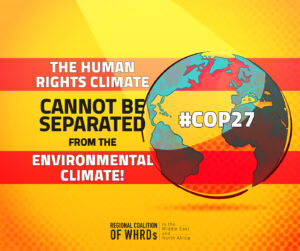The human rights climate cannot be separated from the environmental climate!
Statement – 15 November 2022
The Regional Coalition for Women Human Rights Defenders in the Middle East and North Africa is  following the 27th United Nations Climate Conference, namely COP 27, held from November 6-18, 2022 in Sharm El-Sheikh, Egypt, with interest and concern at the same time, as crimes of violence against women and human rights defenders are widespread in the region. In light of the meeting of more than one hundred world leaders at the conference to celebrate their achievements in combating climate change and their strategies in protecting the environment, it is worth noting that this occurs within a scarcity of information about the violations against environmental defenders in the region, as there is no real documentation of the number of violations they face, which amount to sexual violence and sometimes murder, both in their work in defending the need to address climate change and the violence it imposes on women farmers, migrants and indigenous people due to forced displacement, and the lack of water provision and their inability to benefit from it, which forces women to travel long distances to obtain it, which exposes them to crimes of sexual violence.
following the 27th United Nations Climate Conference, namely COP 27, held from November 6-18, 2022 in Sharm El-Sheikh, Egypt, with interest and concern at the same time, as crimes of violence against women and human rights defenders are widespread in the region. In light of the meeting of more than one hundred world leaders at the conference to celebrate their achievements in combating climate change and their strategies in protecting the environment, it is worth noting that this occurs within a scarcity of information about the violations against environmental defenders in the region, as there is no real documentation of the number of violations they face, which amount to sexual violence and sometimes murder, both in their work in defending the need to address climate change and the violence it imposes on women farmers, migrants and indigenous people due to forced displacement, and the lack of water provision and their inability to benefit from it, which forces women to travel long distances to obtain it, which exposes them to crimes of sexual violence.
The United Nations Environment Program confirmed the exacerbation of crimes of violence against women as a result of climate changes, and that 80% of the displaced and those who are homeless as a result of climate changes are women, in the absence of real policies in the region that would address this matter, as the “United Nations High Commissioner for Human Rights Michelle Bachelet (that) while women sleep, wash, bathe or dress in shelters, tents or camps, their risk of sexual violence turns into a tragic reality in their lives as migrants or refugees. Human trafficking, child marriage, early and forced marriage, which are borne by women and girls on the move, multiply this threat to them.” Accordingly, there is an urgent need in this context to pay attention to this issue, specifically the situation of environmental activists and defenders in the region and the need to open spaces closed to work in most of the region, and the incorporation of real steps to the general plan for sustainability that includes the rights of all women to participate in development and climate justice, and emphasize that the right to safe housing and non-forced displacement is part of climate justice and food sovereignty for the indigenous people to preserve the activities in which they work, such as agriculture pastoralism, including the cultivation of wild plants, the development of frameworks that clarify the relationship of women farmers with countries and protection frameworks for them as an integral part of their empowerment to preserve the environment, and the need to hold accountable those who commit violent crimes, displacement and murder against environmental defenders, women farmers and defenders of the right to land, and there is an urgent need to design a plan that contains sustainable efforts to document these crimes and to identify its patterns and the surrounding context from a feminist perspective, in addition to launching progressive and practical proposals to address it.
The regional coalition for women human rights defenders in the Middle East and North Africa also emphasizes the need to open the public sphere not only to environmental defenders, but also to open the closed spaces of feminist activism and civil society, stop the continued marginalization of women’s rights and discrimination against them, specifically in the private sphere, where the murder of women is increasing in the region by both state actors and non-state actors, and the participating governments from the region in the twenty-seventh United Nations climate conference should bear their responsibilities in creating a safe and welcoming climate for women human rights defenders, where they can continue to defend their rights and express their opinions freely, away from from being exposed to the risks of defamation and arbitrary arrest and legal prosecution under justifications related to maintaining national security, and public safety, and exposing them to physical and sexual violence and murder. The human rights climate cannot be separated from the “environmental” climate, and the participating governments in the region must confront themselves regarding their complicity with the crimes committed against women human rights defenders, women and girls, and take serious steps in providing a safe climate and environment for work, not only on issues related to climate change, but on all issues related to human rights and human rights for women in general.

